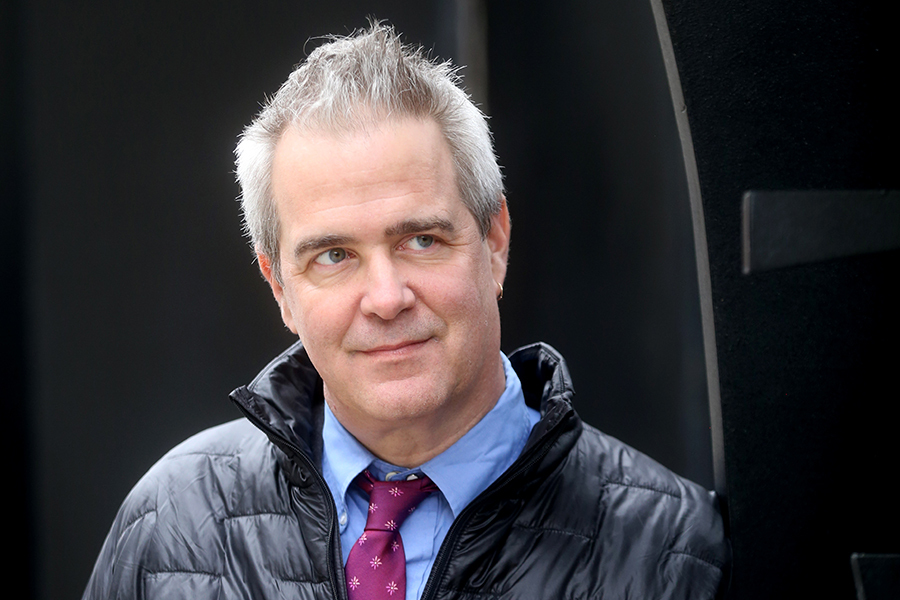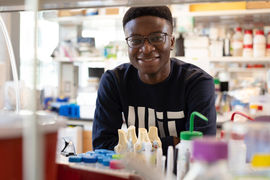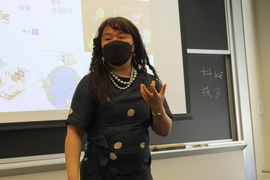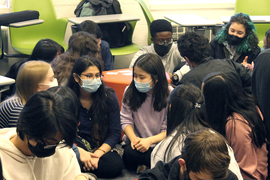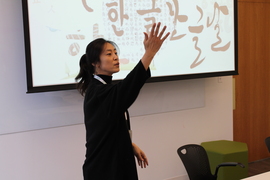In July 2022, Professor Per Urlaub joined MIT as the new director of Global Languages. A prolific researcher in second-language studies and on the role of technology in language and humanities education, he holds a teaching appointment in MIT’s literature section. He came to MIT after having served in a variety of faculty and leadership roles at the University of Texas at Austin and Middlebury College. Urlaub spoke with the School of Humanities, Arts and Social Sciences communications team to discuss the impact of Global Languages on the undergraduate experience and his vision for the future for language education at MIT.
Q: What does Global Languages offer to the MIT community?
A: Global Languages provides undergraduate programs in nine world languages throughout the year and in several less-commonly taught languages every January. We offer majors, minors, and concentrations that enrich our students’ personal lives and enhance their professional impact. Therefore, we should not be surprised that many students supplement their STEM-focused training with language and intercultural education. The 32 lecturers and senior lecturers in Global Languages, as well as supporting faculty from other units, collectively generate the largest number of concentrators at MIT. This spring, about 25 percent of the graduating class will leave MIT with a concentration in one of the programs offered in Global Languages. I am proud of the massive impact that Global Languages has on the undergraduate experience at MIT, but I also recognize the responsibility that comes with this footprint.
Q: Why are languages so popular among MIT students?
A: I see three reasons for our growing popularity.
Relevance. Our students perceive our classes as meaningful. Countless conversations with them confirm that the mission of Global Languages is closely aligned with the aspirations of today’s student generation. At Global Languages, we believe in the critical importance of language competencies and intercultural awareness for future generations of ethical change-makers. Humanity’s most urgent challenges (climate, conflict, poverty) can only be addressed through international collaboration among experts with global mindsets. Our students see that our classes empower them to listen across cultures, to share their expertise internationally, and to have a transformational impact at a planetary scale.
Quality. Our classes are academically rigorous. Students never feel that they are wasting time in a Global Languages classroom. My instructional team includes some of the most prolific experts on matters that relate to postsecondary language education in the country. Every team member is developing and implementing instructional innovations in our classrooms every day. Equally important, all members of the team are committed teachers. Delivering high-impact educational experiences is at the core of our professional identity. In fact, of the 69 classes the team taught in fall 2022, not a single subject or instructor was rated by our students below 6 out of 7. In the past two years, four Global Language instructors have been named winners of the student-nominated Levitan Teaching Award.
Community. Global Languages brings people together. Providing a caring learning environment and creating a sense of belonging are central to our mission. We do this because, as experts in second-language acquisition research, we know these factors contribute to the extraordinary gains our students make in our programs. The interactive nature of language classrooms and the nurturing commitment of our instructors are the backbone of this dimension to our students’ success. In addition, Global Languages invests intentionally into the creation of a strong sense of belonging for our students. Our aim is that every student feels invited to become part of a tightly-knit academic and social community, and we are honored that many accept this invitation.
Q: What is your vision for the future of Global Languages at MIT?
A: These factors — relevance, quality, and community — are the pillars for future initiatives in Global Languages. Our curriculum becomes even more relevant if we can offer a wider range of language programs, and my team and I are always exploring opportunities. This past winter, for example, we offered an IAP [Independent Activities Period] course in Ukrainian. Professional development that resonates with the needs of an accomplished instructional team is helping us to further elevate the quality of our programs. For example, in early spring we organized an event with Uju Anya from Carnegie Mellon University on antiracist and equity-minded language teaching practices. Later in the semester, Kris Knisely from the University of Arizona shared his research on gender justice in language education. An engaging community that fosters a deep sense of belonging doesn’t just happen automatically. We already offer an impressive array of co-curricular opportunities, and I am looking forward to investing more resources into our community-building efforts in the years ahead. A stronger community elevates our students’ proficiency gains, and also makes language learning more meaningful and fun.
Global Languages attracts more students each year. I want to invest more time to share our success story that is an immediate result of the hard work of my colleagues and the commitment of our students. There are still some folks at MIT who are not fully aware of the growing centrality of Global Languages to the undergraduate experience at MIT. I want to change that over the next years and will inspire even more colleagues and administrators to join me in celebrating the extraordinary achievements of our undergraduate students.
We want to continue growing. But our desire for growth has nothing to do with numbers, spreadsheets, or budget allocations. We want to grow because I and my colleagues know from firsthand experiences that high-impact educational experiences fostering multilingualism and intercultural awareness are central ingredients to a life well lived — both professionally and personally.
